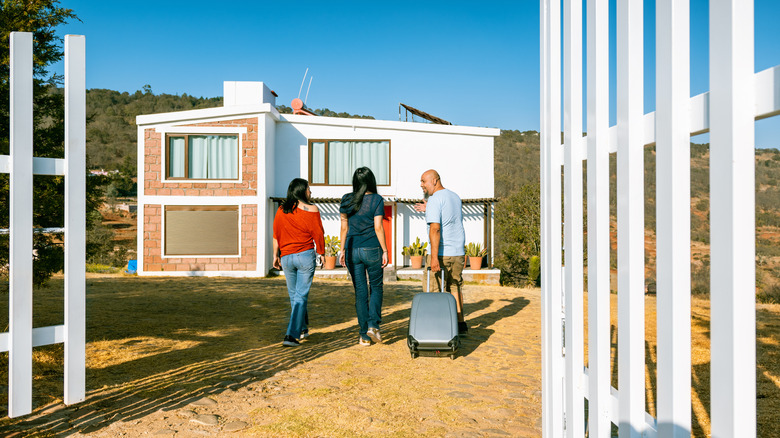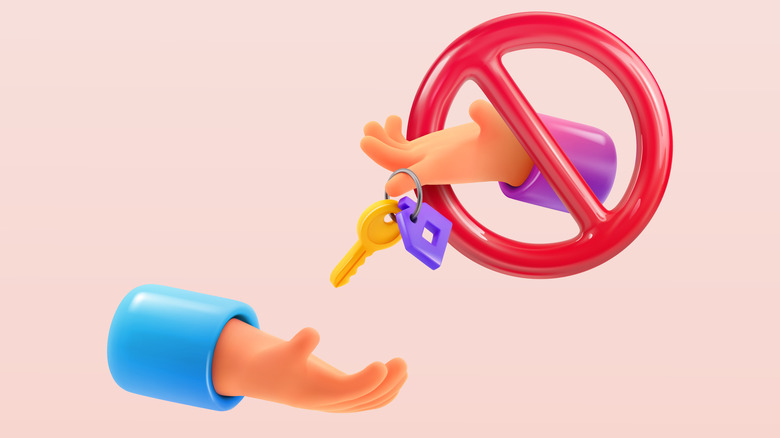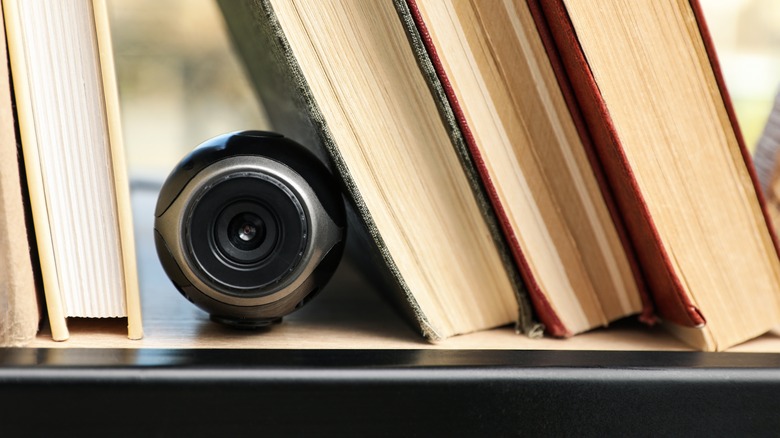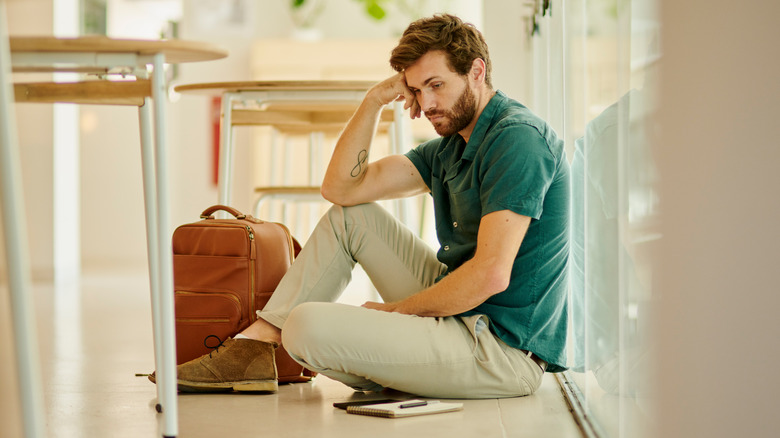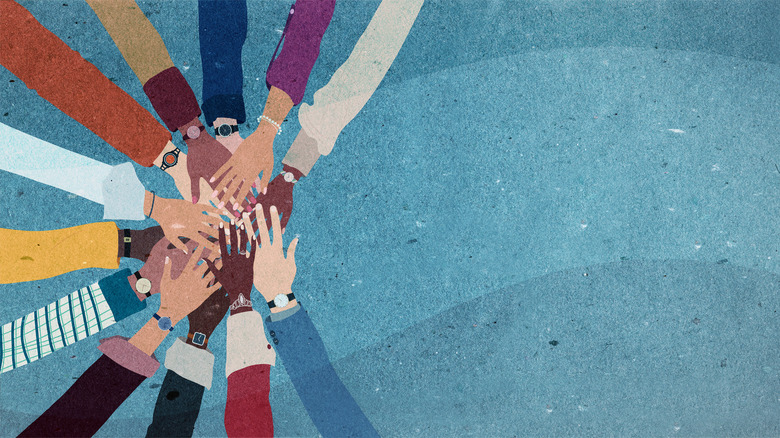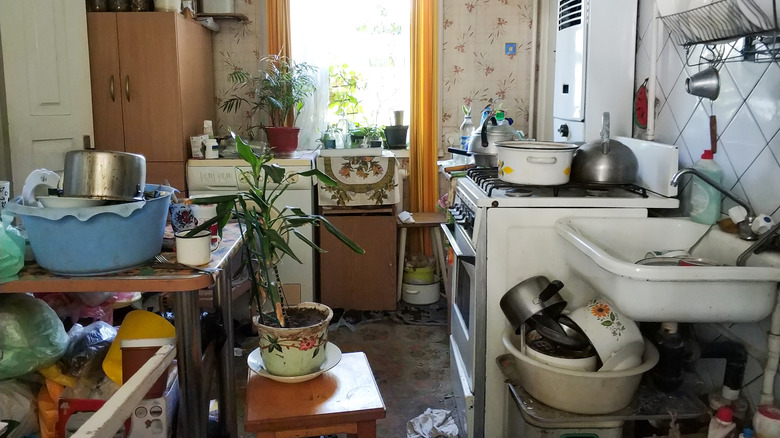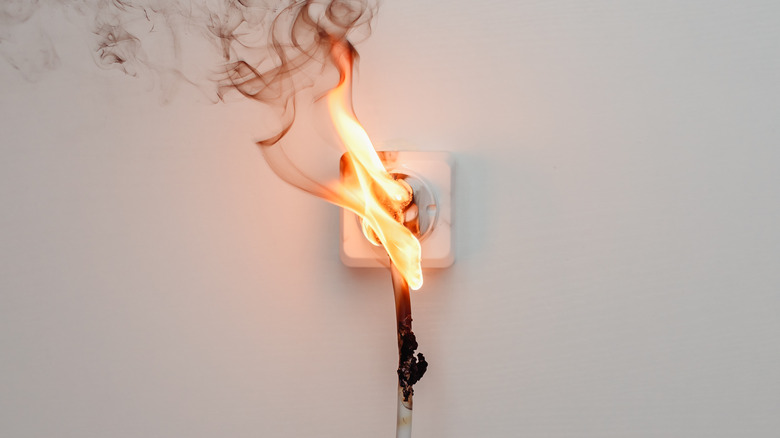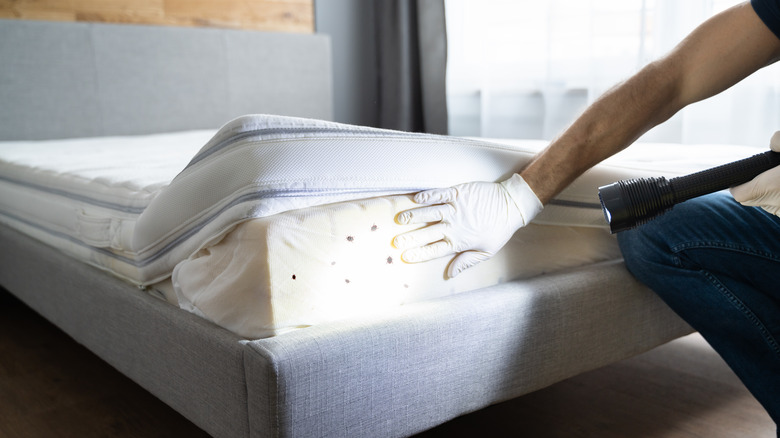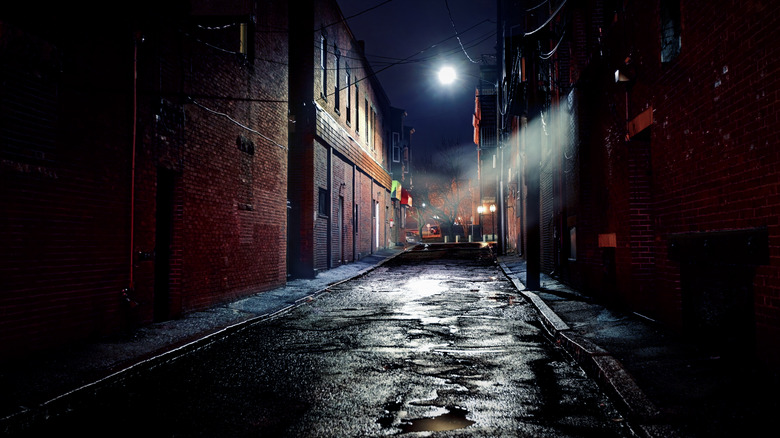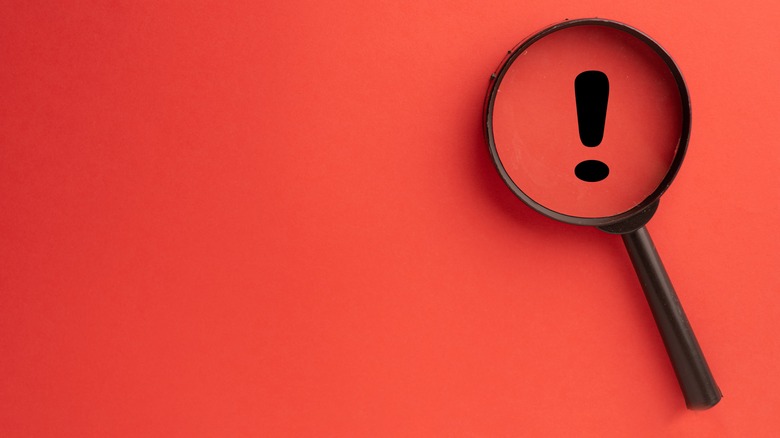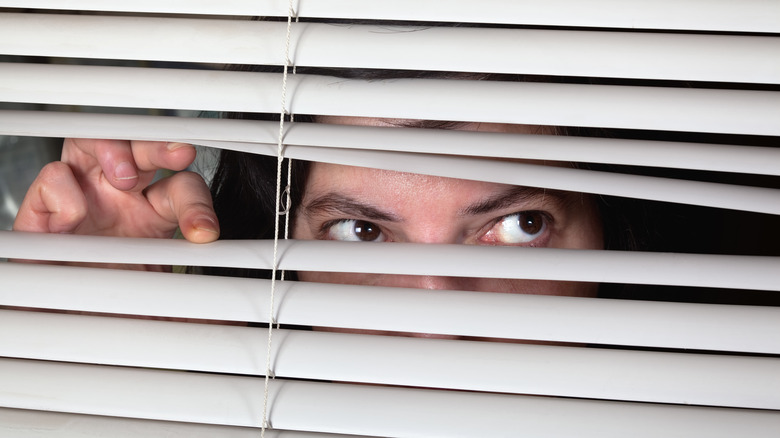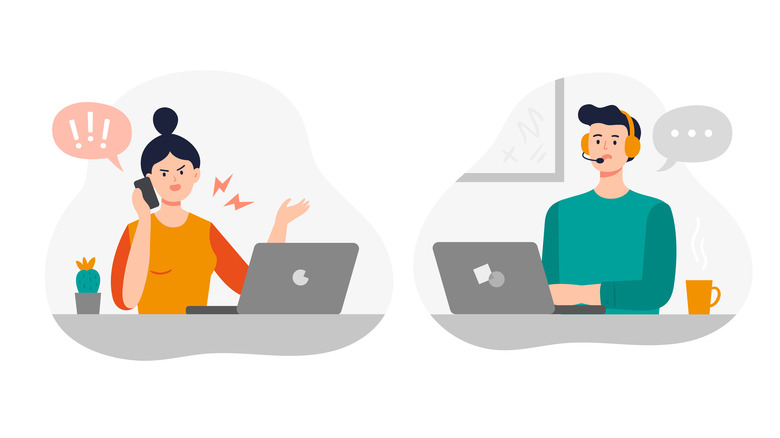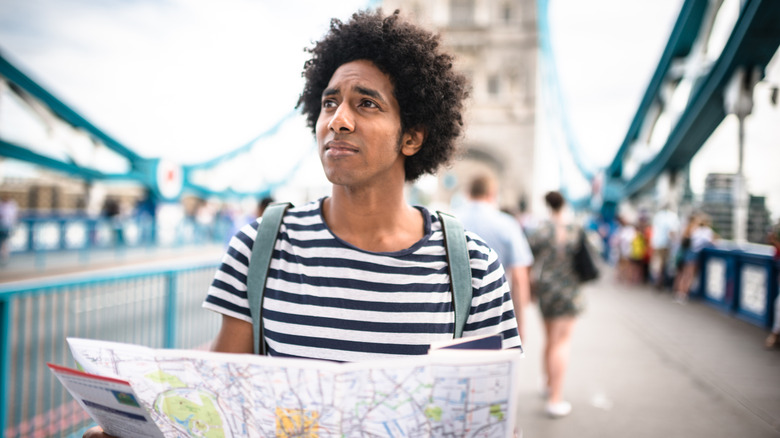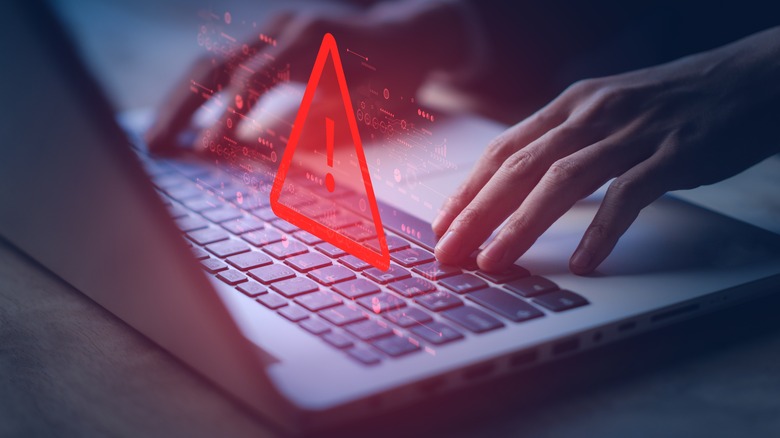The Hidden Dangers Of Airbnbs
The cultural phenomenon of Airbnb began when founder roommates Brian Chesky and Joe Gebbia struggled to cover their rent in 2007. Upon learning about an upcoming swanky San Fransisco event, Joe pitched an idea: Buy a few air mattresses and transform their humble abode into a "designer" bed and breakfast, hence the name "Airbnb." After a few false starts, failed investor meetings, and financial troubles, the company now sits at $80 billion in market value.
However, travelers have been increasingly noticing Airbnb's darker side. Not only does the "rent with locals" approach often contribute to gentrification and worsen housing situations within communities, but the properties may not always provide a better value proposition than hotels — the primary draw of the platform. Some guests even find themselves spending their final vacation day doing a deep clean per the host's rules, only to get dinged with an exorbitant cleaning fee anyway. Beyond these mere inconveniences and societal considerations, though, linger some real hidden Airbnb dangers that can put travelers at risk.
Make no mistake, the vast majority of Airbnb experiences will be safe and fun. There's a good chance you'll get a place for a steal, and you won't spend check-out day in rubber gloves. Regardless, let's examine these lesser-known (but very real) risks for you to keep on the back burner so they don't blindside you during an awesome trip away from home.
Your Airbnb may be illegal
Government reception for Airbnb varies wildly from city to state to country. Several Canadian cities, just to give an example, have strict regulations for any so-called "short-term rentals" to keep them from skirting corporate taxes. Others have leveled de facto bans, such as New York. The result? A handful of Airbnb hosts run their Airbnbs on the down-low.
These illegal Airbnbs may include owners who try to make you complicit in their schemes. They'll enforce a list of peculiar rules to avoid letting neighbors get wind of their vacation rental. They'll require you to sneak in the back way and make sure the cameras don't see you with luggage. If someone asks who you are, you're to tell them that you're "visiting family." CBC News reported how this exact situation happened to Patricia Payne in Toronto, and she is only one of many who've unknowingly rented an illegal Airbnb across the globe.
Accounts differ in how authorities treat guests when they crack down on these illegal rentals. In most cases, the host incurs a fine, and you'll need to find another place for the night. However, you could have unpleasant interactions with the authorities, property managers, and neighbors. Avoid this by researching your destination city's Airbnb laws, and even if it's still legal there, request a refund (through the Airbnb Help Center) from any host who tries to get you to skulk around.
Your host may have a hidden camera
With cameras everywhere these days (your computer, your phone, your doorbell), we've all gotten very conscientious of the fact that a hacker or ne'er-do-well could be watching at any moment from the other side. Yet when you arrive at your Airbnb, you assume privacy is the default and proceed to drop your drawers. Not so fast. Some unsavory Airbnb hosts have been caught placing hidden cameras in their properties, and these cameras may lurk anywhere: the kitchen, the bedroom, or even the shower.
To make matters worse, these cameras may be disguised exceptionally well. Anyone can buy a smoke detector, ceiling light, or wall outlet with a hidden camera from the Internet on the cheap. These cameras can record in full HD and even transmit live feeds. In one viral story shared by Canada's Global News, one Airbnb guest found a hidden camera in the bathroom's electric outlet. Airbnb has a strict policy against hidden cameras and will give a full refund to guests and ban listings when hidden cameras are discovered.
We don't want to scare you unnecessarily, and we imagine the tiny minority of Airbnb owners who have installed cameras (without thinking things through) did so for honest reasons. Still, it doesn't hurt to do a quick sweep of the place for hidden cameras. This may include manually searching, checking smart home device settings (Google Nest, etc.), and looking for potential two-way mirrors. You'll sleep a lot better knowing that no one is watching you.
Hosts can withdraw your booking at any time
Booking a hotel stay or a flight is usually a set-in-stone confirmation that your trip is a go. Airbnbs, sadly, don't give you that same certainty. A host reserves the right to withdraw your booking at any time, even when you've just arrived for check-in. That means you could be stranded with no backup accommodations (sometimes in a foreign country) and limited means to find a new place.
One such Australian guest tells on Airbnb Hell how a last-minute cancellation left them alone in New York City without a place to stay. Cancellations of this nature may demolish your travel plans and strain your already tight travel budget. Hosts can cancel for any reason under the sun, such as wanting the place to themselves for a weekend, although it is in their best interest not to. Punitive measures from Airbnb (and, obviously, scathing Airbnb reviews) prevent this sort of thing from happening. Plus, Airbnb requires hosts to make restitution and secure new accommodations for you ASAP, although this did not happen in the above story.
Our advice is to research availability for other accommodations in the area and bring some rainy-day funds just in case. It's highly unlikely that this will happen to you, but if it does, don't let a host who cancels your Airbnb last-minute ruin your vacay.
Hosts may discriminate against you
Assuming you give them money (and you aren't on the FBI's most-wanted list) hotels really don't care who you are. Airbnb, to our chagrin, does not mandate a philosophy of not judging books by their covers. Hosts get to see a picture of you and then decide if they want to proceed with a booking. Civil rights groups have examined Airbnb's "booking success rate" (whether or not guests can secure their desired listings) and discovered that owners regularly discriminate against marginalized people.
This discrimination may not manifest until check-in day, as Dyne Suh had the misfortune of learning when her host canceled on her because she was Asian, according to a story by the Washington Post. It's safe to say that this discrimination could extend beyond minority status to gender, religion, and so on. Unfortunately, there's no telling what prejudices your host may have, as almost anyone can become a host.
We recommend providing a clear picture of you and any travel companions in your profile for the host to see. By doing so, while shopping for a place to stay, you allow the "trash" to take itself out, as it were, before you secure your booking. Otherwise, exercise the same aforementioned caution by having backup funds for emergency accommodations.
Your place may not reflect the pictures
Airbnb, like hotel booking sites, gives you clear pictures showing off the entire rental in clear detail. People often book based on apparent cleanliness, and assume (rightfully) that the place will be just as spick and span when they arrive. However, digging around the Internet, you'll find stories of horrid Airbnb experiences ruining entire vacations. These stories include homes not being cleaned (at all), random people on the premises doing renovations, and perhaps worst of all, Airbnb completely siding with the host or only offering partial refunds.
In short, the place you rent should look just like the pics. Past evidence, however, makes clear that Airbnb may be uncooperative in giving refunds and securing alternative accommodations when a booking falls below your bare minimum standards. Check your rental for unreasonable uncleanliness and/or unpleasant odors, and don't let them cow you into thinking it's okay, or let them fine you for not cleaning the Airbnb yourself. Though Airbnb support may be a pain, you can likely secure at least a partial refund for dirty conditions, especially if you take photos of the Airbnb for evidence. Also, scan past guest reviews for any mention of questionable conditions before booking.
There may be fewer regulations in place
As much as business owners may whinge about how regulations stifle profitability, regulations often exist as a result of tragic accidents that drove lawmakers to put them into effect. For example, some building fire regulations trace their origins to horrendous disasters like the Triangle Shirtwaist Fire. Airbnbs, given that they're residential properties, do not fall under the same regulation umbrella as hotels.
Take this story by the traveling duo Alison and Braden (reported on their Hong Kong travels blog A Life Shift) whose Bali trip nearly ended in tragedy when an adjoining room caught fire. They were awoken by the smell of smoke in the middle of the night, not a fire alarm. They, their baby, and their possessions survived without a scratch, thanks in great part to their Indonesian neighbors who called the fire department. The point still stands, though: the Airbnb did not have a fire alarm, nor was it required to.
Check the "Safety Features" section of your Airbnb's listing to see if it has a fire alarm, carbon monoxide alarm, and fire extinguisher. Most do. Make a plan for an emergency, such as knowing your exits and keeping important valuables (such as passports) in a ready-to-grab place. Also, ask the host about any safety concerns you may have in advance.
The conditions may be unhealthy
For tolerant guests whose Airbnb is maybe just a bit dusty, they may be able to bite the bullet for the duration and worry about any refunds later. A smattering of grime and a bad smell can't exactly harm your health, right? Some Airbnbs, however, have conditions that are flat-out unhealthy. Recently, the company had a pest epidemic. From Madrid to Tokyo, hundreds of listings reported bed bugs, and that's to say nothing of cockroaches or other issues.
If it's not bugs and mice, it might be the drinking water. On Reddit, Avander22 on the subreddit r/vrbo, alleges that they contracted E. coli in Idaho after their host failed to mention the area was under a Boil Water Alert. While this may be an extreme example, your rental may be susceptible to a host of things, depending on where you're traveling. It might be an older home with traces of asbestos or one with a small gas leak that's detrimental to the health of you and yours.
Always do a full walkthrough of the place before settling in and look for obvious health hazards. Consult the owner if you find something, and they may be able to work with you to fix the issue. Also, check the reviews thoroughly before booking, as someone more knowledgeable about these things may have stayed there and noticed something.
You may find yourself in a bad neighborhood
When browsing Airbnb's map of listings, you're probably doing at least two of the following. Number one, you're looking for the cheapest deal; number two, you're searching in a city you've never been to. That's likely what happened to Madeline Gaffney when she and her roommate accidentally rented a home in a particularly bad area, according to the Elliot Report. Vandals broke into their vehicles, as well as those of their neighbors. They decided enough was enough and relocated to safer lodgings. Airbnb was uncooperative in securing a refund, and Gaffney was only able to get her money back after an advocate reached out to the company's higher-ups.
That cheap Airbnb you're eyeing at your destination could very well be in the sort of place locals stay clear of. It may not be apparent from Google Street View. Again, read your reviews in detail to see what experience previous guests had. Before you get to that point, though, Google that area of the city for local travel guides. You can even find crime maps online for specific cities, such as New York, that show crime-heavy areas to better inform your decision.
The host could be a dangerous person
You would think Airbnb would perform intensive, all-encompassing background checks on all their hosts for the safety of guests. Guess again. Airbnb admits on its own website that their background checks are "limited" and thus offer no guarantees about a host's potential history of crime nor their inclusion on sex offender registries. That's right, your host could be a felon or a sexual predator and still legally rent out their property for guests.
To make matters worse, Airbnb, per their website, rarely runs background checks outside the U.S. and India. They also appear to be unable to determine when someone has provided a false name that is not legally recognized. Last but not least, they only conduct these checks once per user; if the host committed a crime after the check, then Airbnb likely wouldn't know.
We don't want to scare you, since the vast majority of hosts are good folks in search of passive income. Regardless, we also recommend exercising caution. Since Airbnb does not provide a host's full information, which would allow you to search them out in a criminal database or sex offender registry, guest reviews will again be a lifesaver. Also, use common sense, such as keeping the doors locked when on the property, and report suspicious behavior to the authorities first, then Airbnb.
Neighbors may be unwelcoming to Airbnb guests
As we've mentioned, there's a lot of controversy around Airbnb, given that non-local investors will buy up properties solely to use as short-term rentals, which then drives up housing costs for the city's actual residents. We're not here to comment on that, but it does lead to one unfortunate side effect: neighbors may have a chip on their shoulder for Airbnb guests.
Alex and Christy, owners of a legal Airbnb rental, shared on the Airbnb Community Forum that a neighbor continually harasses all their guests. Stories abound across Airbnb's forums (and the Internet at large) of disgruntled neighbors who take out their frustration on you, a paying guest. Most of this harassment is mild, with locals simply airing their grievances. However, in rare cases, things can be more extreme. On Reddit, one user on the r/AirBnB subreddit claimed that a woman filmed them and yelled at them and their children.
It's not your obligation, as a guest, to correct this behavior, so avoid confrontation if at all possible. Contact the authorities if you feel unsafe, and gather video evidence in case you need to explain the incident to your host or Airbnb support. You have a right to peace and safety while vacationing, and this right shouldn't disappear because of issues between your host and their neighbors.
It may be difficult to reach Airbnb support
In the vast majority of cases, Airbnb will be your recourse when something goes wrong. By all means, don't hesitate to contact them if the place is dirty, the owner is rude, or if a promised amenity is missing. Before you do, just go in with the knowledge that their responsiveness and proposed solutions may leave something to be desired.
We could provide countless examples of guests and owners alike going days or weeks without any support response whatsoever. When support does respond, it may be a rocky road to establish the issue before talking solutions. You may have to start all over when a new representative gets assigned to your case, or they may close your unsolved case without explanation, forcing you to reopen it.
We mention this issue as a problem since you may need Aribnb's assistance. It's your right to pursue solutions and compensation where reasonable, but don't make the mistake of relying on Airbnb in an emergency or when time is of the essence. Contact the authorities and find replacement accommodations on your own if necessary. If you can wait, straighten things out with Airbnb and the host after your vacation.
It may be challenging to locate your Airbnb
Airbnbs next to tourist traps and airports command the highest premiums, so it's only natural that you may skip those in favor of cheaper, out-of-the-way lodgings. Perhaps it will be in a quieter, culturally authentic area, you reason, away from the hustle and bustle of tour-guided crowds. Just keep in mind that navigating through a rabbit's warren of foreign neighborhoods and apartment blocks could be a bit tricky. Residential streets and numbers may not be the same as back home, and you may not have landmarks to orient yourself with.
We recommend that you hire an Uber (or any local equivalent) to take you directly from the airport to the Airbnb, and vice versa. It might be more expensive than taking the subway, train, or bus, but it's better to pay a small premium than to get lost. Plus, walking around in an urban area with luggage in tow could unintentionally make you a target for criminals who prey upon tourists. While a map app may help, it's also a good idea to download an offline map with directions in case Wi-Fi is scarce, and then put a map marker on your Airbnb to show a driver.
You could become the victim of a scam
If previous sections of this article are any indication, the Airbnb platform can be prone to unscrupulous business practices. That's what James Temperton learned the hard way when he stumbled into a Battersea rental that was part of an elaborate, London-wide Airbnb scam, as reported by Wired UK. These scams typically manifest as listings with fake pictures, fake reviews, and even an owner who is a completely fabricated, non-existent person. Upon arrival, you might be getting an entirely different unit that's in clear disrepair (or no property at all) and have limited recourse.
The implications for your personal safety in an Airbnb scam are obvious. You don't know who you're dealing with, and someone willing to scam you is probably not someone you should trust on general principles. Plus, your rental may have some or all of the safety risks mentioned above. A clear commonality between many Airbnb scams is aggressive cost-cutting measures to keep expenses down and profits high, which may cause owners to forgo inspections or fail to install safety precautions.
If an owner stoops to a scam of this sort, then there's no telling what else they're capable of. It's best to stay clear. Your best means of prevention in this situation is to Google Airbnb scams in the city you plan to visit. When viewing listings, adopt a critical approach. Does something seem off? Do the pictures look like they're manipulated? Do reviews or host bios seem too good to be true? Don't discount your gut feeling during the scam-spotting process.
